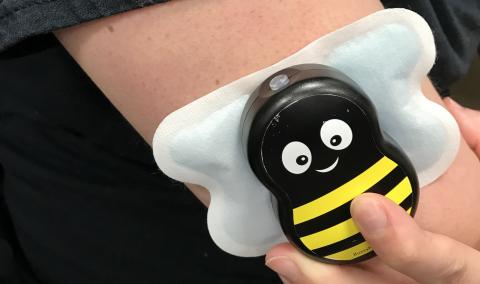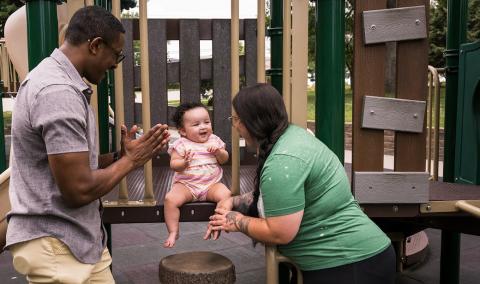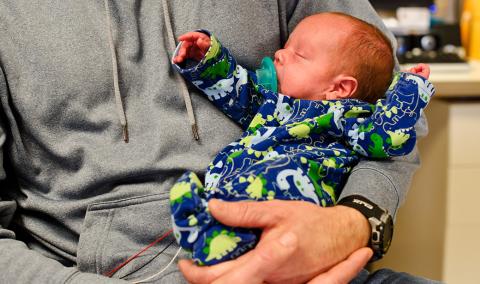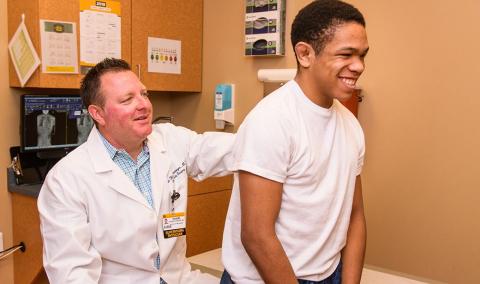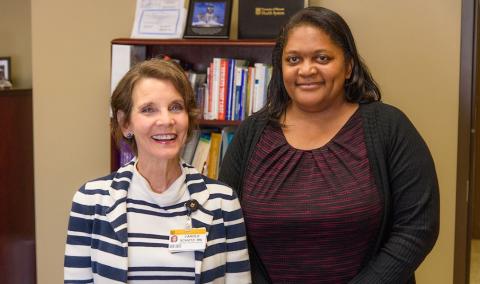It can be frightening to learn that your child has a heart condition. You and your family deserve personalized, compassionate, leading-edge care from a team of pediatric cardiology experts.

University of Missouri Health Care's Children's Hospital offers the only pediatric cardiology program in mid-Missouri. Our combined skills and knowledge ensures your child will be accurately diagnosed and receive state-of-the-art treatment for both congenital (present at birth) and acquired (developed over time) cardiovascular defects and diseases. We treat heart and vascular conditions in fetuses, infants and children.
There are many reasons your child may be referred to a pediatric cardiologist. Some of them include:
- Chest pain
- Congenital or acquired heart disease
- Fainting
- Heart murmur
- Heart palpitations
- Irregular heart rate
We intentionally streamline our services to improve your child's experience, offering:
- One access point for patient examination and diagnostic testing
- Same-day access to consultations and referrals
- Same-day access to diagnostic testing
- Same-day/next-day feedback to referring physicians by phone, email, fax or letter
Our team approach to pediatric heart conditions
We take a team approach to treating pediatric cardiology patients and collaborate with a wide array of specialists and surgeons to ensure your child receives the best care possible.
Your child’s MU Health Care team may include:
- Cardiologists
- Specialized nurses
- Pediatricians
- Social workers
- Child Life specialists
- Researchers
Leading-edge diagnostic tools and treatments
We offer the latest scientifically proven techniques for diagnosing and treating heart conditions in children.
These include:
- Echocardiograms (ECG), including ambulatory ECG
- Electrocardiograms (EKG)
- Treadmill stress tests
- Holter monitors
Congenital heart disease
Congenital heart disease is an abnormal development of a baby's heart sometime during pregnancy. This type of heart disease is usually diagnosed before the baby is born or just after delivery. A maternal fetal medicine specialist can often detect the presence of heart complications in a fetus through the use of ultrasound images.
If early ultrasound images of a developing heart show questionable findings, a pediatric cardiologist can conduct an echocardiogram, even in utero. A fetal echocardiogram provides information to evaluate the structure, function and arrhythmia (abnormal heart rhythm) of the fetal heart. An echocardiogram can also be used just after a baby is delivered if a suspected heart problem was not previously diagnosed.
Acquired heart disease
Acquired heart disease, which develops during childhood, is varied and may occur at any age in life.
The most common heart diseases seen in children in the United States include:
- Abnormal heart rhythms
- Endocarditis (inflammation of the heart lining)
- Heart damage due to infections or viruses
- Hypertension (high blood pressure)
Learn more about Heart & Vascular Care at MU Health Care.
Related Conditions & Treatments
- Adolescent Medicine
- Chest Wall Deformities
- Down Syndrome
- Emergency Care for Kids
- Gastrostomy and Feeding Access Program
- Hyperbaric Oxygen Therapy
- Juvenile Diabetes
- Neonatology
- Pediatric Anesthesiology
- Pediatric Cancer
- Pectus Carinatum
- Pectus Excavatum
- Pediatric Cardiology
- Pediatric Dermatology
- Pediatric Development and Behavior
- Pediatric ENT (Ear, Nose and Throat)
- Pediatric Epilepsy
- Pediatric Eye Care
- Pediatric Gastroenterology
- Pediatric Infectious Diseases
- Pediatric Inpatient Rehabilitation
- Pediatric Nephrology
- Pediatric Neurology
- Pediatric Neurosurgery
- Pediatric Orthopaedics
- Pediatric Plastic Surgery
- Pediatric Primary Care
- Pediatric Psychiatry
- Pediatric Pulmonary Medicine
- Pediatric Sleep Medicine
- Pediatric Surgery
- Pediatric Surgical Services
- Pediatric Urology
- Pediatric Vascular Anomalies
- Pediatric Weight Management
- Sickle Cell Disease
- Aerodigestive Program








